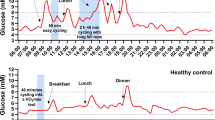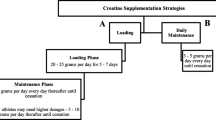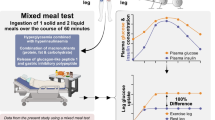Abstract
The influence of alanine on plasma amino acid concentrations and fuel substrates as well as cycling performance was examined. Four solutions [6% alanine (ALA); 6% sucrose (CHO); 6% alanine and 6% sucrose (ALA–CHO); an artificially sweetened placebo (PLC)] were tested using a double-blind, randomised, cross-over design. During each trial, ten cyclists ingested 500 mL of test solution 30 min before exercise and 250 mL after 15, 30, and 45 min of exercise. Participants cycled for 45 min at 75% VO2max followed by a 15-min performance trial. Blood was collected before beverage consumption and prior to the performance trial. Alanine concentration was increased (p < 0.05) by approximately tenfold for ALA and ALA–CHO and less than twofold for CHO and PLC. Alanine ingestion increased concentrations of most gluconeogenic amino acids. Overall, alanine supplementation tended to produce favourable metabolic effects, but did not influence performance.
Similar content being viewed by others
References
Below P, Mora-Rodriguez R, Gonzalez-Alonso J, Coyle E (1995) Fluid and carbohydrate ingestion independently improve performance during 1-hr of intense exercise. Med Sci Sports Exerc 27:200–210
Bergstrom J, Furts P, Hultman E (1985) Free amino acids in muscle tissue and plasma during exercise in man. Clin Physiol 5:155–160
Bodamer OAF, Halliday D, Leonard JV (2000) The effects of L-alanine supplementation in late-onset glycogen storage disease type II. Neurology 55:710–712
Burelle Y, Peronnet F, Charpentier S et al (1999) Oxidation of an oral [13C] glucose load at rest and prolonged exercise in trained and sedentary subjects. J Appl Physiol 86:52–60
Carlin J, Olson E, Peters H, Reddan W (1987) The effects of post-exercise glucose and alanine ingestion on plasma carnitine and ketosis in humans. J Physiol 390:295–303
Coggan A, Coyle E (1987) Reversal of fatigue during prolonged exercise by carbohydrate infusion or ingestion. J Appl Physiol 63:2388–2395
Davis J, Burgess W, Slentz C, Bartoli W (1990) Fluid availability of sports drinks differing in carbohydrate type and concentration. Am J Clin Nutr 51:1054–1057
Dill DB, Costill DL (1974) Calculation of percentage changes in volumes of blood, plasma, and red cells in dehydration. J Appl Physiol 37:274–275
Dohm GL, Tapscott EB, Kasperek GJ (1987) Protein degradation during endurance exercise and recovery. Med Sci Sports Exerc 19:S166–S171
Febbraio MA, Chiu A, Angus DJ et al (2000) Effects of carbohydrate ingestion before and during exercise on glucose kinetics and performance. J Appl Physiol 89:2220–2226
Ivy JL, Res PT, Sprague TC, Widzer MO (2003) Effect of a carbohydrate-protein supplement on endurance performance during exercise of varying intensity. Int J Sport Nutr Exerc Metab 13:382–395
Kelts D, Ney D, Bay C et al (1985) Studies on requirements for amino acids infants with disorders of amino acid metabolism. I. Effect of alanine. Pediatr Res 19:86–91
Koeslag J, Noakes T, Sloan A (1982) The effects of alanine, glucose and starch ingestion on the ketosis produced by exercise and by starvation. J Physiol 325:363–376
Koeslag J, Levinrad L, Lochner J, Sive A (1985) Post-exercise ketosis in post-prandial exercise: effect of glucose and alanine ingestion in humans. J Physiol 358:395–403
Koopman R, Pannemans DLE, Jeukendrup AE et al (2004) Combined ingestion of protein and carbohydrate improves protein balance during ultra-endurance exercise. Am J Physiol Endocrinol Metab 287:E712–E720
Korach-Andre M, Burelle Y, Peronnet F et al (2002) Differential metabolic fate of the carbon skeleton and amino-N of [13C]alanine and [15N]alanine ingested during prolonged exercise. J Appl Physiol 93:499–504
Maughan RJ (1981) A simple, rapid method for the determination of glucose, lactate, pyruvate, alanine, 3-hydroxybutyrate and acetoacetate on a single 20-μl blood sample. Clinica Chimica Acta 122:231–240
McConell G, Snow RJ, Proietto J, Hargreaves M (1999) Muscle metabolism during prolonged exercise in humans: influence of carbohydrate availability. J Appl Physiol 87:1083–1086
McConell GK, Canny BJ, Daddo MC et al (2000) Effect of carbohydrate ingestion on glucose kinetics and muscle metabolism during intense endurance exercise. J Appl Physiol 89:1690–1698
Medelli J, Lounana J, Hill D (2003) Variation in plasma amino acid concentrations during a cycling competition. J Sports Med Phys Fitness 43:236–242
Niles ES, Lachowetz T, Garfi J et al (2001) Carbohydrate-protein drink improves time to exhaustion after recovery from endurance exercise. J Exerc Physiol 4:45–52
Noakes T (2000) Physiological models to understand exercise fatigue and the adaptations that predict or enhance athletic performance. Scand J Med Sci Sports 10:123–145
Parry-Billings M, Budgett R, Koutedakis Y et al (1992) Plasma amino acid concentrations in the overtraining syndrome: possible effects on the immune system. Med Sci Sports Exerc 24:1353–1358
Rennie M, Edwards R, Krywawych S et al (1981) Effect of exercise on protein turnover in man. Clin Sci 61:627–639
Struder H, Hollmann W, Duperly J, Weber K (1995) Amino acid metabolism in tennis and its possible influence on the neuroendocrine system. Br J Sports Med 29:28–30
Van Hall G, Saris WHM, Wagenmakers AJM (1998) Effect of carbohydrate supplementation on plasma glutamine during prolonged exercise and recovery. Int J Sports Med 19:82–86
Walsh NP, Blannin AK, Robson PJ, Gleeson M (1998) Glutamine, exercise and immune function: links and possible mechanisms. Sports Med 26:177–191
Wasserman D, Williams P, Lacy D et al (1988) Importance of intrahepatic mechanisms to gluconeogenesis from alanine during exercise and recovery. Am J Physiol 254:E518–E525
White T, Brooks G (1981) [U–14C] glucose, -alanine, and -leucine oxidation in rats at rest and two intensities of running. Am J Physiol 240:E155–E165
Williams BD, Chinkes DL, Wolfe RR (1998) Alanine and glutamine kinetics at rest and during exercise in humans. Med Sci Sports Exerc 30:1053–1058
Wolfe R, Wolfe M, Nadel E, Shaw J (1984) Isotopic determination of amino acid-urea interactions in exercise in humans. J Appl Physiol 56:221–229
Wolff J, Kelts D, Algert S et al (1985) Alanine decreases the protein requirements of infants with inborn errors of amino acid metabolism. J Neurogenet 2:41–49
Acknowledgments
This study was partially supported by GCRC Grant No. NIH-MO1 RR00827.
Author information
Authors and Affiliations
Corresponding author
Rights and permissions
About this article
Cite this article
Klein, J., Nyhan, W.L. & Kern, M. The effects of alanine ingestion on metabolic responses to exercise in cyclists. Amino Acids 37, 673–680 (2009). https://doi.org/10.1007/s00726-008-0187-6
Received:
Accepted:
Published:
Issue Date:
DOI: https://doi.org/10.1007/s00726-008-0187-6




